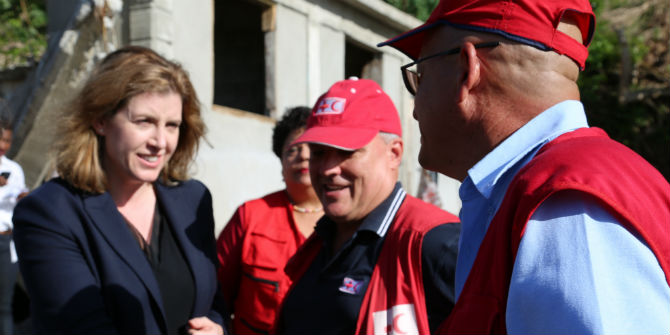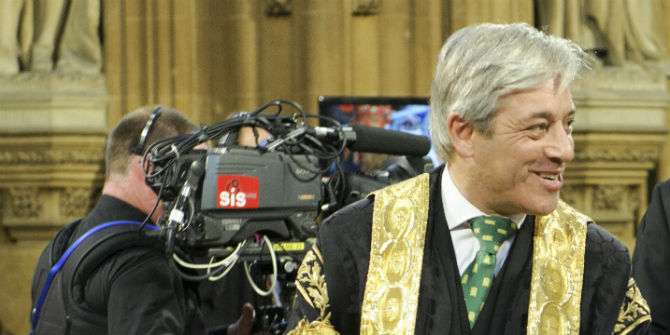 Conservatives who are sceptical about the benefits of traditional overseas aid have been trying to expand its definition. These efforts have taken on a new urgency as they promote a ‘Global Britain’ in which targeted aid boosts British trade, writes Sophia Price (Leeds Beckett University). Cutting the current aid budget would also free up money to deal with the economic uncertainty caused by Brexit.
Conservatives who are sceptical about the benefits of traditional overseas aid have been trying to expand its definition. These efforts have taken on a new urgency as they promote a ‘Global Britain’ in which targeted aid boosts British trade, writes Sophia Price (Leeds Beckett University). Cutting the current aid budget would also free up money to deal with the economic uncertainty caused by Brexit.
The politics of UK aid and of Brexit are deeply intertwined. This is evident in three key dynamics:
- In attempts to redirect UK aid monies back into the domestic economy, to cope with the economic uncertainties resulting from Brexit
- In the use of aid to bolster the Global Britain agenda and counter threats to the UK’s position in the world as a result of leaving the collective economic and political might of the EU
- In the role aid plays in the internal politics of the Conservative party and attempts to garner alliances, particular within and between the pro-Brexit factions.
All three dynamics were most recently demonstrated by the publication of Global Britain: A Blueprint for the 21st Century. The report, co-authored by pro-Brexit Conservative MP Bob Seely, is controversial in that it calls, among others things, for the amalgamation of the Department for International Development (DfID) and the Department for International Trade (DIT) into the Foreign and Commonwealth Office and the redefinition of the OECD’s Development Assistance Committee rules to allow the channelling of aid into UK military spending, to fund UK peacekeeping and the BBC World Service. In the foreword to the report, Boris Johnson MP argues that such efforts, in the context of Brexit, offer the UK the opportunity to ‘turbo-charge’ its global capabilities.

While these themes are not new to debates about aid spending, they have re-energised questions about the purpose and mechanisms of aid provision and development cooperation, and demonstrate how the politics of aid and Brexit are inextricably linked. For example, Priti Patel was a vocal proponent of similar proposals to merge DfID with DIT prior to becoming the Secretary of State for International Development in 2016. She had been a leading figure in the Vote Leave campaign, and was appointed by May to lead DfID after Patel backed her leadership following the referendum and Cameron’s resignation.
Patel had been a long-standing critic of aid policy, and a key figure in early attempts to redefine the UK as ‘Global Britain’. In 2012, along with her co-authors Dominic Raab, Kwasi Kwateng, Chris Skidmore and Liz Truss, Patel produced Britannia Unchained: Global Lessons for Growth and Prosperity, which diagnosed the malaise of the British state pre-Brexit and prescribed a range of solutions, including the reinvigoration of links to the Commonwealth. This theme became central to the Leave campaign and subsequently shaped government policy, which places great emphasis on the UK-Commonwealth relationship as the vehicle for Global Britain, based on new post-Brexit trade agreements supported by the provision of targeted aid.
Within this context the conceptualisation of UK aid has altered greatly – notably through the explicit emphasis on spending efficiencies and the provision of direct returns to the UK economy. In a strong defence of the UK’s 0.7% GNI commitment, May extolled the benefits of aid, particularly in terms of health promotion and education, but stated that it had to work for the UK too.
Notwithstanding the ethical, moral and political debates about the use of aid for the promotion of donor interests, the ‘Value for Money’ agenda has reshaped UK development cooperation. While this reconfiguration of development policy predates the EU referendum, UK aid has been allocated a key role in the preparations for Brexit in expanding UK investment finance and augmenting the position of the City of London, particularly through aid-blending initiatives that combine public and private sector funding to create new investment opportunities.
Africa is a key target for such attention, with the ambition that by 2022 the UK will be the continent’s ‘number one’ G7 investor and its “partner of choice for investment” (Penny Mordaunt, 2018) with Britain’s private sector companies taking the lead in “investing the billions that will see African economies growing by trillions”. Mordaunt, the current Secretary of State for International Development, and another prominent pro-Leave campaigner, has branded the UK’s aid strategy as the ‘reciprocal beam engine of compassion and capital’ with the City of London at its fulcrum.
Mordaunt’s 2018 speech, which she purposely delivered at DFID’s private equity institution the CDC Group, highlighted the centrality of UK financial services to the UK economy and of the City as a hub of international investment. The City has been rapidly cementing its links to nascent capital markets and profitable new expansion opportunities, particularly in Africa. Specific financial provisions, based on development finance and private investments, such as the UK-Africa Fintech Partnership, have been created to support the links between The City, African capital markets and businesses. In her speech, Mordaunt also called for reform of DAC rules, this time to allow CDC investment profits to count towards the UK’s 0.7% aid target.
Provided the aid budget supports the post-Brexit global positioning of UK finance and the City of London – and attempts to reframe what counts as aid – May’s ongoing commitment to the 0.7% GNI target might appear a palatable choice for the Brexiteer wing of her party. However, aid provision has long been a divisive issue for Conservatives. The Eurosceptic Jacob Rees-Mogg personally presented a Daily Express petition to Downing Street in 2018 which called for the end of aid and its ‘criminal waste of money’.
The strong vocal support that Johnson provided to the Seely report, conjuring the narratives of both Rees-Mogg and Patel, represents an attempt to shore up his alliance with that particular arm of his party. Accusations that the ‘swashbuckling’ Johnson is plundering the aid chest therefore have both an economic and political dimension.
While anti-aid sentiment within parts of the Conservative party is deeply ideological, it also reflects the context of austerity and the weak prospects for the post Brexit UK economy. The proposed reduction in oversees aid spending and the repatriation of this funding to the domestic budget could provide a salve for the economic hardships facing the UK. Or – if the 0.7% aid commitment is kept, and barring the unlikely decision for the UK to continue to channel development funding through the EU – UK aid could be redirected to support sectors particularly hard-hit by Brexit. For example, the Global Challenges Research Fund has already seen aid monies reallocated to support research in UK universities, which have been vocal about the negative impact of the loss of EU research funding. Reform of the DAC rules would allow more development of innovative spending responses at a national level, although the extent to which these would meet broader goals of global poverty reduction are open to question.
While the Seely report reflects the latest and very public display of the inter-relationship between Brexit and UK aid, it has quietly been a central element of the Brexit withdrawal bill, particularly the financial ‘divorce’ settlement. The agreed payment of circa €39bn includes longstanding commitments the UK had made to EU aid budgets. For example, the UK’s contributions to the 11th European Development Fund were due to be paid in 2018, over six years after that commitment was initially made. To renege on that allocation of UK aid funds would have significant impacts on people living in poverty throughout the Global South and existing projects supported by EU development spending.
Notwithstanding the current uncertainties about the terms of the UK’s exit from the EU, pivotal sections of the Conservative party will continue to attempt to reframe the terms on which aid is provided – in order to both bolster Britain’s global position, and mitigate the negative impacts of Brexit.
This post represents the views of the author and not those of the Brexit blog, nor the LSE.






